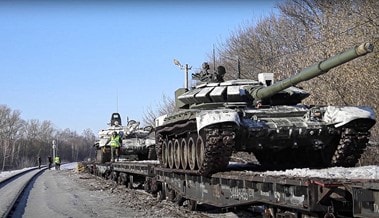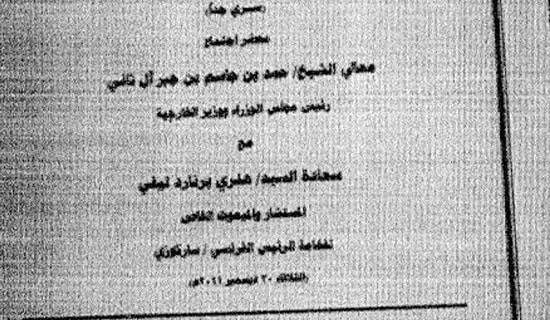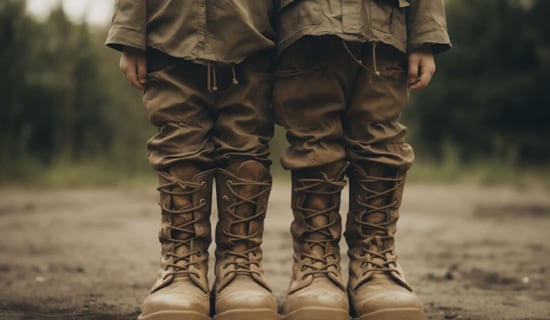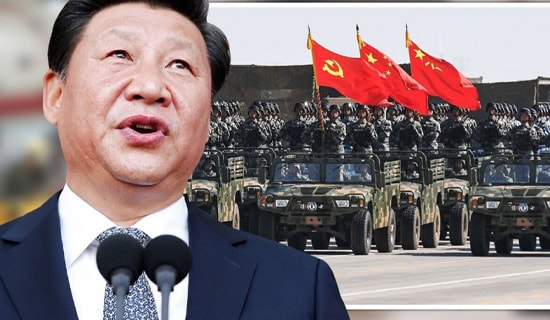On March 14, 2022, the CCP official media "Observer News" (Guancha.cn, 观察网). published an article, titled "Negotiating While Fighting, And Fighting While Negotiating: Will This Become The Norm For Russia And Ukraine?" by Dang Haonan (党浩楠), a graduate student majoring in Russian foreign policy at the Moscow State Institute of International Relations.
Although the article clearly supports Russia's stance, it also casts a grim prospect of Russia’s war launched against Ukraine. The article says: “Some media comments and public opinion thought earlier that Putin might retreat amid the overwhelming odds and end his military operations against Ukraine as soon as possible when faced with the fierce resistance from Ukraine and the unprecedented economic sanctions imposed by the West. But from Putin's recent public speeches, we can sense that Russia is so determined to push forward with the war this time even though its casualties may far exceed estimates. The suspension of the ‘special military operation’ without a fundamental solution to the ‘Ukrainian issue’ means that the enormous political, economic and military prices that Russia has paid will get wasted for nothing. A political failure such as this one is unacceptable regardless."
The article then concludes: "I sincerely hope that Ukraine, which has suffered many disasters since ancient times, can achieve political independence and find a path of peaceful development despite being surrounded by more powerful neighbors."
Below is the article:[1]

(Source: Cgtn.com)
'[On] February 24, 2022, Putin Suddenly Launched A Military Operation Against Ukraine’
"In the early morning of February 24, 2022, Putin suddenly launched a military operation against Ukraine. Days earlier, on the 21st, Putin delivered an hour-long speech on Russian TV. In his shocking speech, he denounced the United States for treachery, manipulating NATO's eastward expansion, undermining Russia's geo-security interests, and announced Russian recognition of the independent status of two separate republics in eastern Ukraine.
"Nevertheless, when the largest military conflict in Europe since World War II finally broke out on the 24th, it still took the world by surprise. This article will analyze the situation based on information from various perspectives, including the battlefields and the diplomatic negotiations between Russia and Ukraine.
"Shortly after the conflict broke out, there were reports of exchanges of fire in Kyiv, Kharkov, Odessa, and Donbass in Ukraine. Most of Ukraine's military airfields were attacked by missiles and precision-guided weapons.
"After the first day of fighting, the Russian Ministry of Defense stated, ‘The military infrastructure, air defense facilities, military airfields, and aviation facilities of the Ukrainian Armed Forces have been paralyzed by high-precision weapons.’ He stressed that the Russian armed forces did not launch any missile, air strikes, or artillery strikes on Ukrainian cities. The strike against Ukraine did not endanger civilians.
"Russian ground forces launched simultaneous offensives on three fronts from the Belarusian border to Kyiv, northward from the Crimean Peninsula, and from the Donbas region.
'The Real Purpose Of Russian Military Operations… Has Not Yet Been Fully Revealed'
"In the early days of the war, the Russian military was successful in making their strikes a surprise, and the Ukrainian side suffered a major blow, but soon the situation started to change. First, the 76th Division of the Russian elite airborne troops captured Antonov Airport at the beginning of the war, which is only 25 kilometers away from Kyiv. However, due to the slow progress of the follow-up reinforcements and the underestimation of the resistance of the Ukrainian army, this strategic location was quickly recaptured by the Ukrainian army’s counterattack.
"After the Ukrainian army recovered from the panic at the beginning of the war, it used some of the more advanced man-portable weapons provided by NATO to successfully ambush the Russian armored transport troops in some areas. Only two days after the start of the war, some Russian soldiers were captured, and the Ukrainian army ‘allowed’ these prisoners of war to contact their families and posted the video online. As a weak defender, these moves gave Ukraine an advantage in psychological warfare and shattered predictions that Russia would end military operations quickly and with overwhelming results.
"As of February 27, judging from the overall situation of the three fronts, except for the rapid advance of the Russian army in the southern Donbas, the rest of the region encountered fierce resistance from the Ukrainian army, especially in some places near the capital Kyiv, where some areas repeatedly changed hands.
"This is due to multiple reasons. First of all, compared with the army who withdrew from the Crimean Peninsula without firing a single shot in 2014, the combat effectiveness of the Ukrainian army has been greatly improved in recent years with the support of NATO training and equipment. More importantly, in 2014, the relationship between Russia and Ukraine was still quite complicated. At that time, it was difficult for many Ukrainian soldiers to see the Russian army as an enemy, and were incapable of ‘making a ruthless attack’ towards Russians. However, after eight years of bloody conflict in eastern Ukraine and the changes in Ukraine’s domestic political atmosphere, now, as they face the Russian army entering their country by force, the Ukrainian soldiers have become ‘relentless.’
SUPPORT OUR WORK

"On the Russian side, it seems that the Ukrainian army's combat capability was underestimated; the first round of precision strikes by the Russian army was not very effective, and the Ukrainian command center is still operating normally.
"Another reason the Russian attack has stalled is that the Russian military is under great moral pressure when fighting outside of their own country. In order to avoid civilian casualties as much as possible, the Russian military could not take advantage of its huge firepower and implement artillery coverage before launching an attack. In the face of weapons such as the ‘Javelin’ anti-tank missile, the Russian army seems to be at a loss.
"With the subsequent slow but ‘solid’ advancement of the Russian army, although some shortcomings in the Russian army's tactics can still be seen, it has not yet led to a setback to the strategy of the entire military operation.
"On March 2, Kherson, Ukraine's first major city, fell, and Mariupol on the Black Sea coast was also surrounded by the Russian army. In addition, Snake Island was captured by the Russian Navy at the beginning of the war. This means that the Sea of Azov has become Russia's inland sea. On March 6, it was reported that the Russian army was about to bomb Odessa, the last stronghold of the Ukrainian army on the Black Sea coast. Once Odessa fell, there would be no doubt that all the sea ports in Ukraine would be under the control of the Russian army.
"According to recent developments on the battlefield, the important northern town, Kharkiv, has been struggling for many days, and it is difficult to predict how long the Ukrainian defenders will last. The two ‘republics’ in the east, which have just been recognized by Putin, have launched a fierce attack on the positions built by the Ukrainian defenders for eight years with the assistance of the Russian army.
"It is clear that the southern Russian troops will go further north, forming a huge pincer shape, encircling the Ukrainian military force concentrated in the Donbas region, which is almost half of the main force of the Ukrainian army.
"Right now, the situation in the capital, Kyiv, is still not as tense as it could be, but the main force of the Ukrainian army in the east is indeed in jeopardy; if the Russian army completes the encirclement, it will be difficult for the Ukrainian resistance to persist for long.
"But why the Ukrainian army did not withdraw from the Donbas area in the face of such an obvious encirclement, I think is for two main reasons: First, the Ukrainian army has basically lost air supremacy, and a large-scale retreat will easily become a target for the Russian air and space forces. The second and most important reason involves the real purpose of Russian military operations, which has not yet been fully revealed.
"According to the ‘Republics’ of Donetsk and Luhansk recognized by Russia, their ‘territorial boundaries’ are contiguous with the two administrative states under Ukraine; before the recent Russian military operation, the separatists Eastern Ukraine armed forces only controlled less than half of their claimed ‘sovereign territory.’ If the Ukrainian army withdraws from these regions, and the Eastern Ukraine armed forces would occupy all the claimed territory de facto, this part of the country is likely to be out of the control of Kyiv forever, just like the Crimea.
'Even If Russia Could Now Force Ukraine To Sign A Document Guaranteeing Its Neutrality, Such A Treaty Would Not Be In Line With International Law'
"All kinds of news about the battlefield have been contradictory and mixed with truth and falsehood, but the information about the Russia-Ukraine negotiations has been released accurately, in a timely manner by both sides, and has been basically consistent with each other.
"The Russians sent a five-member delegation to the first negotiation, headed by Presidential Assistant Mezinsky. The delegation included Deputy Foreign Minister Andrei Rudenko in charge of CIS affairs, Chairman of the State Duma Committee on International Affairs Leonid Slutsky, Ambassador to Belarus Boris Grizlov, and Deputy Defense Minister Alexander Fomin, who participated in the U.S.-Russian Strategic Stability Dialogue two months ago.
"Mezinsky graduated in 1992 from the Moscow Institute of International Relations, where I am currently studying, and which is known for its emphasis on an in-depth study of history. Mezinsky was born in the Cherkasy region of Ukraine during Soviet-era. Now as an assistant to the Russian president, he has come to peace talks over a military operation launched to ‘correct the error of 'Synthesizing Ukrainian History' which was committed by the Bolsheviks.’
"Mezinski was cultural secretary before becoming assistant to the president. He does not seem to attract as much attention as Lavrov and Shoigu did, but he has long been responsible for Russia's official ideological propaganda and is a member of Putin's inner circle of staff.
"Rudenko, from the Russian Ministry of Foreign Affairs, also graduated from the Moscow Institute of International Relations (‘85) and is currently the youngest Russian Deputy Foreign Minister. He can speak Chinese, but his work is not related to China affairs, and he is mainly responsible for handling relations with the CIS countries.
"Grizlov is the current Russian ambassador to Belarus, but he is not a career diplomat. He has long been in charge of the party affairs of the United Russia Party, which has close ties with Putin, and served as the leader of the United Russia Party and the chairman of the State Duma. Because the negotiation was held in Belarus, he also participated in the talks.
"The members of Ukrainian negotiations team are: David Arakamia, leader of the People's Servant Party, which is President Zelenskyy's party; Ukrainian Defense Minister Alexei Reznikov; adviser to the President Office Mikhail Reznikov Podoljak; Deputy Foreign Minister Tochitsky; Verkhovna Rada; MP Umerov; and First Deputy Head of the Tripartite Liaison Team on Ukraine Koskin.
"The photos leaked after the meeting showed that there was also a seventh representative in the Ukrainian delegation who was not announced in advance. According to Russian media, the person was identified by his appearance as Denis Kireev, a Ukrainian banker. Even more unexpectedly, the Ukrayinska Pravda reported on the 5th that Kiriev, after the first round of negotiations, was shot and killed by the Ukrainian Security Service and was charged with treason.
"What is worth noting is that in these negotiations, all the Ukrainian delegates are in ‘military uniforms,’ and they always arrive after the Russian delegation. Moreover, the two sides have been at loggerheads over the venue in which to hold negotiations, often getting it settled only the day before the talks themselves.
"These signs all reflect the mutual distrust between Russia and Ukraine. The Ukrainian side wants to show the outside world a sense of oppression by foreign forces, while the Russian side agrees to negotiate more to show a gesture of not giving up plans for peace.
"In fact, not long after the war began, the two sides began to discuss negotiations. To many people's surprise, the final negotiations were held as scheduled on February 28. Russia's demands are the original reasons behind what Putin called ‘special military operations:’ recognition of Russia's sovereignty over Crimea; demilitarization and de-Nazification of Ukraine; and ensuring Ukraine's neutrality relative to NATO.
"Setting aside whether it is possible for Ukraine to agree to Russia's requests, looking at the issue from a technical point of view, it is basically impossible to realize the second and third articles. So-called ‘denazification’ is a concept invented entirely by the Russian side. Ukraine has never considered itself a ‘Nazi regime.’ As for what constitutes ‘denazification,’ nobody knows so far.
"Commitment to neutrality can be said to have certain precedents, such as Switzerland for hundreds of years and Austria after World War II, but it is an autonomous choice made by a country in peace time. Even if Russia could now force Ukraine to sign a document guaranteeing its neutrality, such a treaty would not be in line with international law.
"And the conditions put forward by Ukraine are also almost impossible to meet; namely, the withdrawal of all Russian troops, including from Crimea and the Donbass. However, even if each party has put forward impossible demands, the two sides still reached consensus on one issue: both expressed their willingness to conduct the next negotiation.
"The second negotiation between Russia and Ukraine was held on March 3, and the only result was that the two sides reached an agreement on the establishment of a humanitarian corridor for a temporary ceasefire. Russia agreed to temporarily cease fire while civilians are being evacuated through humanitarian corridors. For the time being, this consensus can be considered a sign that neither side is willing to bear the moral condemnation for inflicting civilian casualties. In particular, Russia, as the initiator of military operations, has shown considerable caution in dealing with this issue. While emphasizing the accuracy of its own military strikes, Russia also condemned right-wing military organizations such as the Ukrainian Azov battalion for preventing the evacuation of civilians through the humanitarian corridor.
'Putin May Retreat And End The Military Operation Against Ukraine'
"Since the start of the war, an endless stream of videos and news about the downing of Russian fighter jets and the destruction of tanks and armored vehicles have emerged. This evidence reflects some tactical mistakes of the Russian army.
"But it should also be noted that one of the reasons for the widespread dissemination of such information is the selective disregard of Russian information by the mainstream media, and on social media such as Twitter, information announced by Russia is labeled as fake news, or banned outright. In response, the Russian government blocked Twitter, BBC, Voice of America, and other media on the grounds of ‘wartime controls.’ We can see that in terms of information warfare and public opinion warfare, Russia is in a relatively unfavorable, defensive situation.
"However, looking at the overall situation, I can say that the Russian army’s setbacks do not mean that the weaker situation of the Ukrainian army can be fundamentally changed. First, the Russian army's north-south pincer offensive continues to threaten half of the Ukrainian fighting force in the Donbas region. Secondly, now that the Russian army has basically obtained air supremacy, there is news that Eastern European countries are considering handing over Soviet-made MiG fighters to Ukraine. From here, it’s a short leap to the following conclusion: At present, the Ukrainian army is mainly using the geographical advantages of some urban areas and the weapons assisted by NATO to try to delay the military operations of the Russian army. But driving the Russian counterattack out of the country, or even retaking Crimea, cannot be done without air supremacy and heavy equipment.
"Looking at their overall strategy, the Russian military can still continue to fight steadily, occupying major strategic locations in Ukraine step by step, gradually forcing Ukraine to accept the political conditions set by Russia.
"A popular analysis is that, in the face of fierce resistance from Ukraine and unprecedented economic sanctions from the West, Putin may retreat and end the military operation against Ukraine as soon as possible. However, judging from Putin's recent public speeches, Russia is very firm on its current course, even if the casualties exceed expectations. Suspending the ‘special military operation’ without a fundamental solution to the ‘Ukrainian issue’ means that the huge political, economic and military costs Russia has paid will be in vain. Such a political failure is unacceptable.
"Under these circumstances Russia and Ukraine, through negotiation and diplomatic contact, should exert their collective wisdom and strive to find a political solution acceptable to both sides and serve the best interests of all parties, with the least cost to both. I sincerely hope that Ukraine, which has suffered many disasters since ancient times, can achieve political independence and find a path of peaceful development despite being surrounded by more powerful neighbors.”
[1] M.guancha.cn/danghaonan/2022_03_14_630173.shtml, March 14, 2022.




